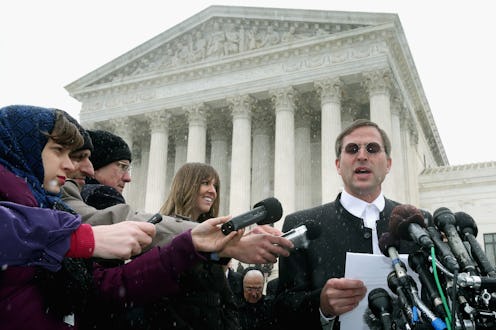News
Hobby Lobby Decision Could Hinge On 'Swing Vote'
The Supreme Court heard 90 minutes of oral argument on the Hobby Lobby contraception lawsuit Tuesday, and gave some subtle indicators of how the court's nine justices may be leaning. And those indicators suggest, not unusually, that the ruling will likely fall in the hands of one man — Justice Anthony "swing vote" Kennedy. Bad news: We could be approaching yet another win for "religious freedom," at least insofar as closely-held private companies are concerned.
A closely-held corporation is one in which a small number of people control a large amount of the company's shares. Hobby Lobby, Inc., for example, is owned in large part by the Oklahoma-based Green family, which has a strong Christian background.
Barbara Green, one such owner (and mother of company president Steven Green) was happy with what she heard, she told press.
We believe that Americans don't lose their religious freedoms when they open a family business. We were encouraged by today's arguments.
The cause that has animated Hobby Lobby is the requirement in the Affordable Care Act that they provide health insurance coverage that includes contraception. Hobby Lobby isn't opposed to absolutely all contraception (though some companies relevant to an eventual ruling might) — specifically, they don't want to have to offer coverage for forms of emergency contraception, like Plan B.
The companies argue that they should have the right to exercise their religious consciences, and refuse to provide that coverage.
Whether that happens is well and truly up to Kennedy, it would seem — the court seems destined to fall along its usual partisan split, with Justices Roberts, Alito, Scalia and Thomas on one side, and Sotomayor, Kagan, Breyer and Ginsberg on the other. Kagan was skeptical of the effort, as she voiced to the companies' arguing attorney, Paul Clement:
If your argument were adopted ... then you would see religious objectors come out of the woodwork with respect to all of these laws.
Solicitor General Donald Verrilli, arguing for the government, warned the court would be "on thin constitutional ice" to exempt the companies, given the harm such a ruling would cause specifically to women.
This sentiment was also echoed by Kagan, who commented that a female employee would be "quite directly, quite tangibly harmed" by such a refusal of coverage.
